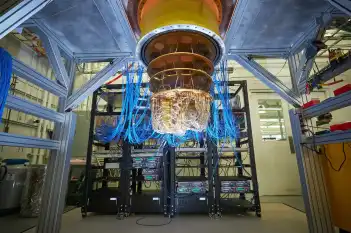A quantum computer is a type of computer that uses quantum mechanics principles to perform calculations. Quantum mechanics is a branch of physics that studies the behavior of matter and energy at a very small scale, such as atoms and subatomic particles. Unlike classical computers that use bits to store and process information, which can be either 0 or 1, quantum computers use quantum bits or qubits that can exist in multiple states simultaneously.
Qubits can represent multiple states at the same time because of a phenomenon called superposition. In classical computing, a bit can represent either 0 or 1, but in quantum computing, a qubit can represent both 0 and 1 simultaneously. This allows quantum computers to perform certain calculations much faster than classical computers. Another property of qubits is called entanglement, where two or more qubits can become linked in such a way that the state of one qubit affects the state of the others, even when they are separated by a large distance.
Quantum computers are still in the early stages of development, and building a stable and reliable quantum computer is a challenging task. However, researchers believe that quantum computers have the potential to solve certain types of problems that classical computers are unable to solve efficiently. For example, quantum computers can be used to factor large numbers, which is essential for many encryption algorithms used in modern communication systems. Quantum computers can also be used to simulate complex systems, such as molecules and chemical reactions, which can help in drug discovery and materials science.
In summary, a quantum computer is a type of computer that uses the principles of quantum mechanics to perform calculations. It uses qubits that can exist in multiple states simultaneously and can be entangled, allowing it to perform certain calculations much faster than classical computers. Although still in the early stages of development, quantum computers have the potential to revolutionize many fields, including cryptography, simulation, and materials science.
difference between computer and quantum computer
Computers and quantum computers are both devices used for performing calculations, but they operate in fundamentally different ways. Here are some key differences between computers and quantum computers:
-
Operating Principles: A classical computer operates on classical physics principles and uses bits, which can represent either a 0 or 1, to perform calculations. On the other hand, a quantum computer uses quantum mechanics principles and uses qubits, which can exist in multiple states simultaneously, to perform calculations.
-
Processing Power: Quantum computers have the potential to be much more powerful than classical computers in certain types of calculations. Quantum computers can perform certain tasks exponentially faster than classical computers, such as factoring large numbers and simulating complex systems. However, quantum computers are not faster in all types of calculations, and they are still in the early stages of development.
-
Error Correction: Classical computers use error-correcting codes to ensure the accuracy of their calculations. Quantum computers, on the other hand, are prone to errors due to factors such as decoherence, which is the loss of quantum coherence over time. To mitigate these errors, quantum computers use error correction techniques that involve encoding the qubits in such a way that errors can be detected and corrected.
-
Hardware: Classical computers are built using traditional electronic components such as transistors, while quantum computers use different types of hardware, such as superconducting circuits, ion traps, or photonic circuits.
-
Applications: Classical computers are used for a wide range of applications, such as word processing, gaming, and data analysis. Quantum computers, on the other hand, are still in the early stages of development and have a limited set of applications. Some potential applications of quantum computers include cryptography, optimization, and simulation.
In conclusion, computers and quantum computers are fundamentally different devices that operate on different principles. Quantum computers have the potential to be much more powerful than classical computers in certain types of calculations, but they are still in the early stages of development and have a limited set of applications. Classical computers are used for a wide range of applications and are built using traditional electronic components, while quantum computers use different types of hardware and require error correction techniques to ensure the accuracy of their calculations.



